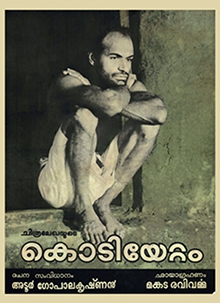Kodiyettam
| Kodiyettam (Ascent) | |
|---|---|
 |
|
| Directed by | Adoor Gopalakrishnan |
| Produced by | Kulathoor Bhaskaran Nair |
| Written by | Adoor Gopalakrishnan |
| Starring |
Bharath Gopi K. P. A. C. Lalitha |
| Cinematography | Mankada Ravi Varma |
| Edited by | M. Mani |
| Distributed by | Chitralekha Film Society |
|
Release date
|
|
|
Running time
|
128 minutes |
| Country | India |
| Language | Malayalam |
Kodiyettam (Malayalam: കൊടിയേറ്റം, English: Ascent) is a 1978 Indian feature film production written and directed by Adoor Gopalakrishnan. It is in Malayalam. The film notably does not feature any kind of film score.
The film captures the ascent of the protagonist, Shankaran Kutty, from a carefree individual to a mature responsible adult. The opening sequences, canned by the director himself, shows Shankaran Kutty- attending a temple festival. The film proceeds to show the irresponsible and often nomadic life style of Shankaran Kutty. Shankaran Kutty, though seemingly at the beginning of middle age, spends most of his time playing around with children, joining political processions and helping the villagers when he is not attending temple festivals. He is provided for by his younger sister who works as a house maid in the city of Thiruvananthapuram. His sister in an attempt to get his life organized arranges a marriage for him. But to the dismay of his new wife, Shankaran Kutty continues his life style often staying away from home for weeks. The already pregnant wife soon leaves him, and Shankaran Kutty does not make any attempt to have her back at home.
Shankaran Kutty's life takes a turn from there on. His sister starts living in their family home with her new husband and slowly he finds himself out of place. Shankaran Kutty's coming of age is also shown through another sub-plot in the movie. He realizes the hard realities of human life, when the widow who used to act as a patron for him commits suicide after being cheated in love. He reaches a turning point in his life when he joins a truck driver as an assistant. Though he finds the job too much to handle at first, he slowly adapts to the new responsibilities of life. He starts making amends with his wife. The film ends when Shankaran Kutty has a happy reunion with his wife and newborn son.
The film has a structure that resembles a typical Kerala temple festival. The title itself is an allusion to the first ceremony in the temple festival where a flag is hoisted to mark the beginning of the proceedings. The director commented that the film's most important connection to the festivals is the fact that in both nothing really happens; the only notable thing in both is the very presence of the people and events.
Kodiyettam interweaves multiple aspects of a rural society with astonishing character growth of a man named Shankarankutty. In the initial parts of the movie Shankarankutty is a man who lives a life mostly unaware of what is happening around him; a poor individual who is unable to associate and indulge in his surroundings. Yet Shankarankutty always wanted to do things others were able to do. However he could do them only after he came in touch with a lorry driver. Shankarankutty always cherished an emotional connection with the widow who committed suicide because of her illicit relationship. Although he had doubts regarding her behavior he could never actually come up with any true evidence by sight but only by sounds. Whenever he got a chance to meet Sukumara Pillai and the widow together, there had to be some distractions which made it difficult for him to see what really happened between the two or what did they talk to each other, if they talked anything. His evidences for their relationship is supported by them talking to each other (audio) rather than being able to see them together (visual) . He knew the reason for her suicide only by overhearing the two speaking about her illegal conception. This fortune of not being able to see her with another man helps him to maintain ideal images of the two; a generous dutiful mother and widow Savithriyamma and the well-respected master, Sukumara Pillai.
...
Wikipedia
